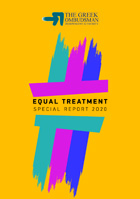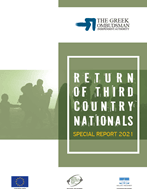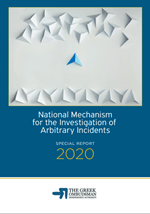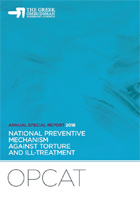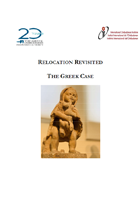Submission of a complaint
- 1. How do I submit a report to the Greek Ombudsman?
- 2. Is there a deadline to my having recourse to the Greek Ombudsman?
- 3. Can foreign nationals have recourse to the Greek Ombudsman?
- 4. Can minors have recourse to the Greek Ombudsman on their own without the presence or signature of a parent?
- 5. Can a legal entity under private law (such as a union, institution, company) or an association of persons without a legal profile (such as a citizens’ initiative) have recourse to the Greek Ombudsman?
- 6. Can legal entities under public law have recourse to the Greek Ombudsman?
- 7. Can someone have recourse to the Greek Ombudsman on behalf of a third party?
- 8. Is an anonymous complaint accepted?
1. How do I submit a report to the Greek Ombudsman?
- In person (or through a representative), at the Authority’s offices (17 Halkokondyli St, 104 32 Athens), during workdays, 08:30-14:00 hours, Wednesdays 08:30-16:30 hours.
- By post at the postal address cited above
- By fax, at +30 213 1306 800 and +30 210-72 92 129
- On-line, using the following complaint form
2. Is there a deadline to my having recourse to the Greek Ombudsman?
Yes. The Greek Ombudsman does not undertake cases if more than six (6) months have elapsed since the complainant was informed of the administration’s illegal action or lack of action.
3. Can foreign nationals have recourse to the Greek Ombudsman?
Yes, regardless of the legal status of their entry or residence in the country.
4. Can minors have recourse to the Greek Ombudsman on their own without the presence or signature of a parent?
Yes, if the case has to do with the protection of children’s rights, they can call free of charge the Greek Ombudsman’s helpline for children (800.11.32000), send an e-mail to the e-mail address cr@synigoros.gr or through the website http://www.0-18.gr/. They can also visit the Authority’s offices to discuss their case in the space specially designed for children, or send their complaint by post or by fax.
5. Can a legal entity under private law (such as a union, institution, company) or an association of persons without a legal profile (such as a citizens’ initiative) have recourse to the Greek Ombudsman?
Yes.
6. Can legal entities under public law have recourse to the Greek Ombudsman?
Yes, if they are acting as an advocate of rights whose safeguarding falls within the Greek Ombudsman’s authority, such as a Higher Education Institute advocating academic freedom, the Church on religious freedom etc. Also, if they are advocating and representing the collective rights of their members, such as lawyers’ or doctors’ associations, chambers of commerce, municipalities on environmental issues etc.
No, if their case concerns an issue involving the relation of the legal entity under public law with the state, such as a Municipality vs a Region.
7. Can someone have recourse to the Greek Ombudsman on behalf of a third party?
For one thing, this can be accomplished only through authorisation in writing or representation as stipulated by law. Exceptionally, no authorisation is needed if the complaint is being made on behalf of someone who, due to extraordinary circumstances, is in no position to sign it, or if the complaint is being made by an attorney on behalf of a client.
Especially when it comes to children’s rights, a complaint may be submitted by any party directly interested: i.e. the child, the parent/guardian (no joint consensus of both parents is necessary), a relative, a supervisor, or any other individual directly aware of a violation of children’s rights (a neighbour, a professional, a service, an association, a group of minors etc).
8. Is an anonymous complaint accepted?
No. However, the Greek Ombudsman can keep the identity of a complainant confidential if the complainant so requests in writing and provided that an investigation into the complaint is feasible without notifying the competent public sector service.
Especially in the case of a complaint submitted by a minor, the minor is asked whether she/he consents to the Authority’s contacting the parents/guardians or the competent civil service. The minor is also asked about the manner she/he wishes to communicate with the Authority.




